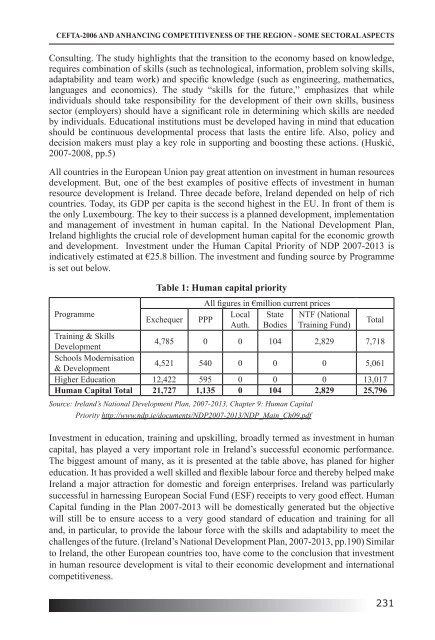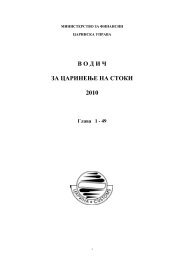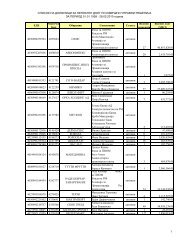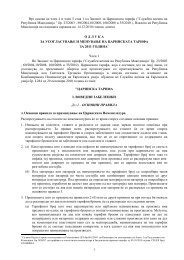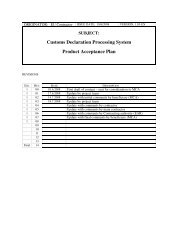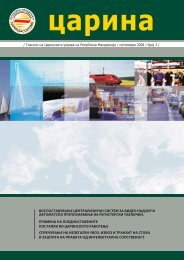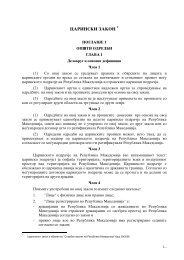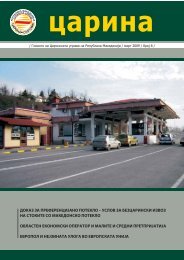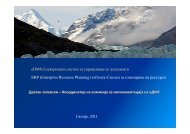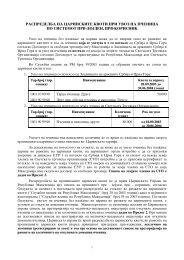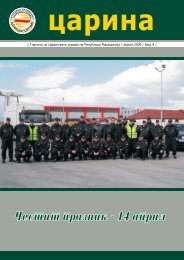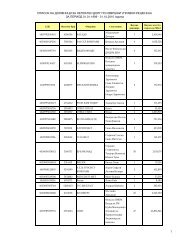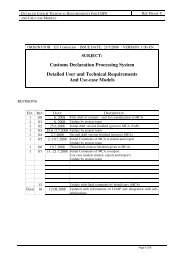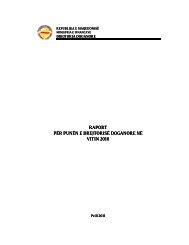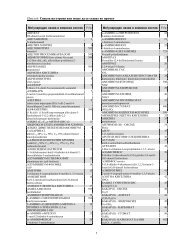REGIONAL COOPERATION AND ECONOMIC INTEGRATION
REGIONAL COOPERATION AND ECONOMIC INTEGRATION
REGIONAL COOPERATION AND ECONOMIC INTEGRATION
- No tags were found...
You also want an ePaper? Increase the reach of your titles
YUMPU automatically turns print PDFs into web optimized ePapers that Google loves.
CEFTA-2006 <strong>AND</strong> ANHANCING COMPETITIVENESS OF THE REGION - SOME SECTORAL ASPECTS<br />
Consulting. The study highlights that the transition to the economy based on knowledge,<br />
requires combination of skills (such as technological, information, problem solving skills,<br />
adaptability and team work) and specific knowledge (such as engineering, mathematics,<br />
languages and economics). The study “skills for the future,” emphasizes that while<br />
individuals should take responsibility for the development of their own skills, business<br />
sector (employers) should have a significant role in determining which skills are needed<br />
by individuals. Educational institutions must be developed having in mind that education<br />
should be continuous developmental process that lasts the entire life. Also, policy and<br />
decision makers must play a key role in supporting and boosting these actions. (Huskić,<br />
2007-2008, pp.5)<br />
All countries in the European Union pay great attention on investment in human resources<br />
development. But, one of the best examples of positive effects of investment in human<br />
resource development is Ireland. Three decade before, Ireland depended on help of rich<br />
countries. Today, its GDP per capita is the second highest in the EU. In front of them is<br />
the only Luxembourg. The key to their success is a planned development, implementation<br />
and management of investment in human capital. In the National Development Plan,<br />
Ireland highlights the crucial role of development human capital for the economic growth<br />
and development. Investment under the Human Capital Priority of NDP 2007-2013 is<br />
indicatively estimated at €25.8 billion. The investment and funding source by Programme<br />
is set out below.<br />
Table 1: Human capital priority<br />
All figures in €million current prices<br />
Programme<br />
Local State NTF (National<br />
Exchequer PPP<br />
Auth. Bodies Training Fund)<br />
Total<br />
Training & Skills<br />
Development<br />
4,785 0 0 104 2,829 7,718<br />
Schools Modernisation<br />
& Development<br />
4,521 540 0 0 0 5,061<br />
Higher Education 12,422 595 0 0 0 13,017<br />
Human Capital Total 21,727 1,135 0 104 2,829 25,796<br />
Source: Ireland’s National Development Plan, 2007-2013, Chapter 9: Human Capital<br />
Priority http://www.ndp.ie/documents/NDP2007-2013/NDP_Main_Ch09.pdf<br />
Investment in education, training and upskilling, broadly termed as investment in human<br />
capital, has played a very important role in Ireland’s successful economic performance.<br />
The biggest amount of many, as it is presented at the table above, has planed for higher<br />
education. It has provided a well skilled and flexible labour force and thereby helped make<br />
Ireland a major attraction for domestic and foreign enterprises. Ireland was particularly<br />
successful in harnessing European Social Fund (ESF) receipts to very good effect. Human<br />
Capital funding in the Plan 2007-2013 will be domestically generated but the objective<br />
will still be to ensure access to a very good standard of education and training for all<br />
and, in particular, to provide the labour force with the skills and adaptability to meet the<br />
challenges of the future. (Ireland’s National Development Plan, 2007-2013, pp.190) Similar<br />
to Ireland, the other European countries too, have come to the conclusion that investment<br />
in human resource development is vital to their economic development and international<br />
competitiveness.<br />
231


